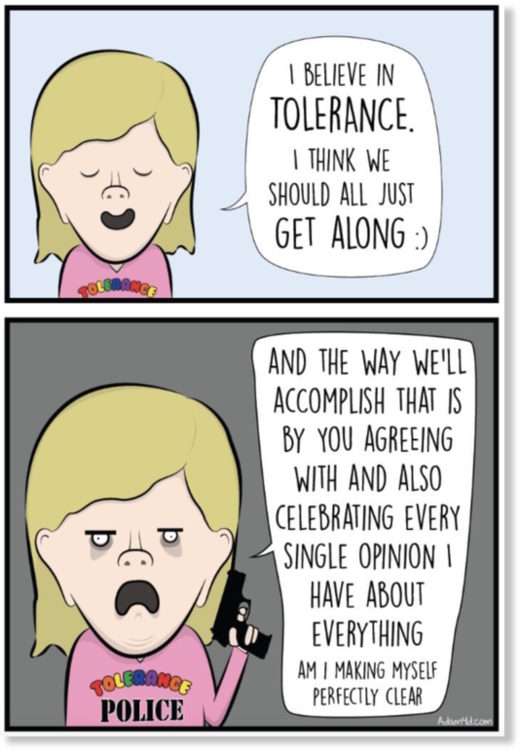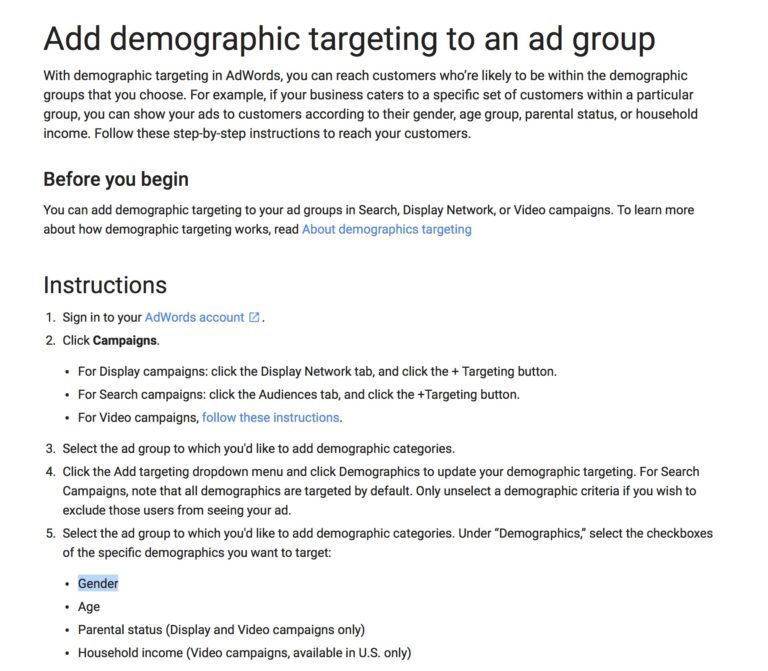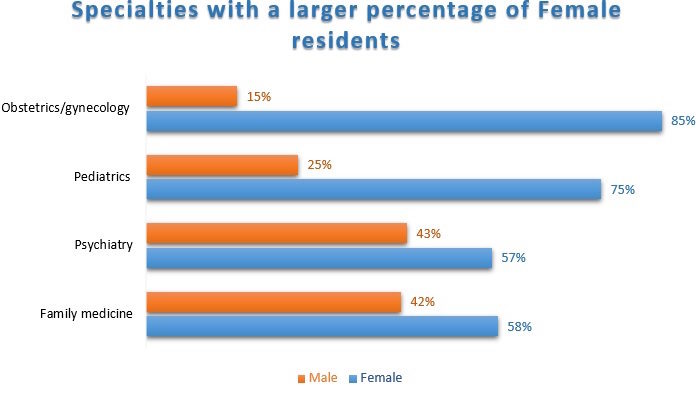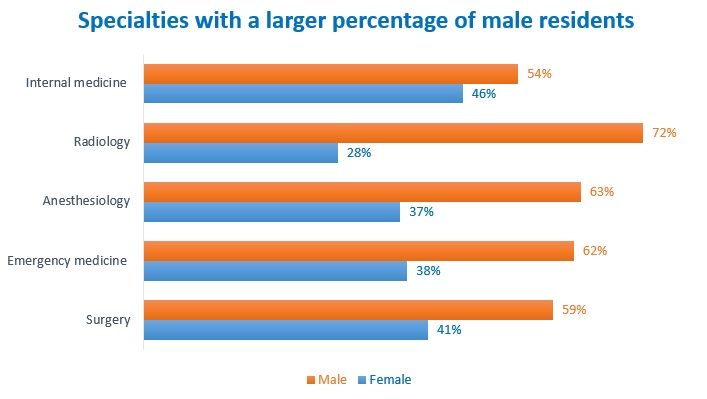As everyone knows by now, Google went ahead and fired James Damore, the author of the now infamous memo on Google's Ideological Echo Chamber. In yesterday's piece I remarked about how shocked I was by the extraordinarily charged and hyperbolic language being used by so many of those who disagreed with what Mr. Damore wrote. Indeed, the language and mischaracterizations of the memo itself were so completely unhinged in many instances, it's hard for me to believe that many of these people even read it in the first place.
First off, while I happen to agree with a lot of what he wrote, that's besides the point. If you read the memo it's obvious that the author went out of his way to avoid triggering people who are easily triggered. Whether or not you agree with the conclusions, it was written in a respectful and measured way. He goes out of his way to clarify what he's saying so as not to be misunderstood. Here are just a couple examples of what I mean:
I'm not saying that all men differ from all women in the following ways or that these differences are "just." I'm simply stating that the distribution of preferences and abilities of men and women differ in part due to biological causes and that these differences may explain why we don't see equal representation of women in tech and leadership. Many of these differences are small and there's significant overlap between men and women, so you can't say anything about an individual given these population level distributions.Incredibly, people are calling this guy (who has a masters degree in Systems Biology from Harvard) a Nazi because he has a different opinion than the dogmatic prevailing consensus within what clearly is a Google echo chamber culture. He was politely trying to have a discourse about a topic he feels passionately about and did so in a respectful way. For that unforgivable act, he's been deemed a misogynist Nazi and fired. I'm not the first person to note that by firing him for writing this, Google essentially proved his point regarding the company's closed cultural and ideological environment.
I hope it's clear that I'm not saying that diversity is bad, that Google or society is 100% fair, that we shouldn't try to correct for existing biases, or that minorities have the same experience of those in the majority. My larger point is that we have an intolerance for ideas and evidence that don't fit a certain ideology. I'm also not saying that we should restrict people to certain gender roles; I'm advocating for quite the opposite: treat people as individuals, not as just another member of their group (tribalism).
Indeed, what Google did to this employee is a textbook example of "ritual defamation," as Yale professor Nicholas Christakis explained in a recent tweet.
Despite being fired, James Damore will be just fine. There are enough people completely sick and tired of the authoritarian left for him to have countless opportunities. I'm not so sure about Google. In fact, I'd expect many talented people at the company to start looking for new, less ideologically stifling jobs, and I think ten years from now the brain drain from Google will likely be obvious. Google has publicly demonstrated itself as a drab and intellectually dishonest place to work, and such a place cannot and will not attract the best and brightest in tech.
Not to mention the fact that when it comes to making money from ads, Google is perfectly fine with "perpetuating gender stereotypes" (the supposed reason they fired Mr. Damore). For example, take a look at this screenshot from the Google adwords page, Add Demographic Targeting to an Ad Group:
Target by gender. There you go. When it comes to Google making money, gender differences suddenly exist.
Moving along, although Google executives clearly lack the maturity and wisdom to take the memo as an opportunity to have a productive and rigorous debate, plenty of other people have. One of the most interesting articles I've read in this regard was written by Scott Alexander and published at Slate Star Codex. He comes at the issue by explaining his view that many of the very real and observable differences in professions between men and women can be explained not by sexism or capacity, but by different interests at the population level between the genders. In other words, the whole "men tend to like to work with things, and women tend to like to work with people" observation that James Damore discussed in his memo.
Here's an excerpt from the piece, but I highly recommend reading the entire thing:
Might girls be worried not by stereotypes about computers themselves, but by stereotypes that girls are bad at math and so can't succeed in the math-heavy world of computer science? No. About 45% of college math majors are women, compared to (again) only 20% of computer science majors. Undergraduate mathematics itself more-or-less shows gender parity. This can't be an explanation for the computer results.
Might sexist parents be buying computers for their sons but not their daughters, giving boys a leg up in learning computer skills? In the 80s and 90s, everybody was certain that this was the cause of the gap. Newspapers would tell lurid (and entirely hypothetical) stories of girls sitting down to use a computer when suddenly a boy would show up, push her away, and demand it all to himself. But move forward a few decades and now young girls are more likely to own computers than young boys - with little change in the high school computer interest numbers. So that isn't it either.
So if it happens before middle school, and it's not stereotypes, what might it be?
One subgroup of women does not display these gender differences at any age. These are women with congenital adrenal hyperplasia, a condition that gives them a more typically-male hormone balance. For a good review, see Gendered Occupational Interests: Prenatal Androgen Effects on Psychological Orientation to Things Versus People. They find that:Consistent with hormone effects on interests, females with CAH are considerably more interested than are females without CAH in male-typed toys, leisure activities, and occupations, from childhood through adulthood (reviewed in Blakemore et al., 2009; Cohen-Bendahan et al., 2005); adult females with CAH also engage more in male-typed occupations than do females without CAH (Frisén et al., 2009). Male-typed interests of females with CAH are associated with degree of androgen exposure, which can be inferred from genotype or disease characteristics (Berenbaum et al., 2000; Meyer-Bahlburg et al., 2006; Nordenström et al., 2002). Interests of males with CAH are similar to those of males without CAH because both are exposed to high (sex-typical) prenatal androgens and are reared as boys.In their own study, they compare 125 such women and find a Things-People effect size of -0.75 - that is, the difference between CAH women and unaffected women is more than half the difference between men and unaffected women. They write:
Females with CAH do not provide a perfect test of androgen effects on gendered characteristics because they differ from females without CAH in other ways; most notably they have masculinized genitalia that might affect their socialization. But, there is no evidence that parents treat girls with CAH in a more masculine or less feminine way than they treat girls without CAH (Nordenström et al., 2002; Pasterski et al., 2005). Further, some findings from females with CAH have been confirmed in typical individuals whose postnatal behavior has been associated with prenatal hormone levels measured in amniotic fluid. Amniotic testosterone levels were found to correlate positively with parent-reported male-typed play in girls and boys at ages 6 to 10 years (Auyeung et al., 2009).
The psychological mechanism through which androgen affects interests has not been well-investigated, but there is some consensus that sex differences in interests reflect an orientation toward people versus things (Diekman et al., 2010) or similar constructs, such as organic versus inorganic objects (Benbow et al., 2000). The Things-People distinction is, in fact, the major conceptual dimension underlying the measurement of the most widely-used model of occupational interests (Holland, 1973; Prediger, 1982); it has also been used to represent leisure interests (Kerby and Ragan, 2002) and personality (Lippa, 1998).The results support the hypothesis that sex differences in occupational interests are due, in part, to prenatal androgen influences on differential orientation to objects versus people. Compared to unaffected females, females with CAH reported more interest in occupations related to Things versus People, and relative positioning on this interest dimension was substantially related to amount of prenatal androgen exposure.What is this "object vs. people" distinction?
It's pretty relevant. Meta-analyses have shown a very large (d = 1.18) difference in healthy men and women (ie without CAH) in this domain. It's traditionally summarized as "men are more interested in things and women are more interested in people". I would flesh out "things" to include both physical objects like machines as well as complex abstract systems; I'd also add in another finding from those same studies that men are more risk-taking and like danger. And I would flesh out "people" to include communities, talking, helping, children, and animals.
So this theory predicts that men will be more likely to choose jobs with objects, machines, systems, and danger; women will be more likely to choose jobs with people, talking, helping, children, and animals.
Somebody armed with this theory could pretty well predict that women would be interested in going into medicine and law, since both of them involve people, talking, and helping. They would predict that women would dominate veterinary medicine (animals, helping), psychology (people, talking, helping, sometimes children), and education (people, children, helping). Of all the hard sciences, they might expect women to prefer biology (animals). And they might expect men to do best in engineering (objects, machines, abstract systems, sometimes danger) and computer science (machines, abstract systems).
I mentioned that about 50% of medical students were female, but this masks a lot of variation. There are wide differences in doctor gender by medical specialty. For example:
A privilege-based theory fails - there's not much of a tendency for women to be restricted to less prestigious and lower-paying fields - Ob/Gyn (mostly female) is extremely lucrative, and internal medicine (mostly male) is pretty low-paying for a medical job.As I mentioned yesterday, I'm pleased Mr. Damore wrote this memo, because this conversation is long overdue. I hope people aren't afraid to say what they think, because our cultural hostility toward debate is getting ridiculously dangerous. If people aren't allowed to write a thought provoking memo in a polite manner questioning corporate policies without being fired, we've lost an essential component to any halfway decent civilization - the ability to have a conversation without name calling and career destruction. If we've truly lost that, we are doomed.
But the people/thing theory above does extremely well! Pediatrics is babies/children, Psychiatry is people/talking (and of course women are disproportionately child psychiatrists), OB/GYN is babies (though admittedly this probably owes a lot to patients being more comfortable with female gynecologists) and family medicine is people/talking/babies/children.
Meanwhile, Radiology is machines and no patient contact, Anaesthesiology is also machines and no patient contact, Emergency Medicine is danger, and Surgery is machines, danger, and no patient contact.
Here's another fun thing you can do with this theory: understand why women are so well represented in college math classes. Women are around 20% of CS majors, physics majors, engineering majors, etc - but almost half of math majors! This should be shocking. Aren't we constantly told that women are bombarded with stereotypes about math being for men? Isn't the archetypal example of children learning gender roles that Barbie doll that said "Math is hard, let's go shopping?" And yet women's representation in undergraduate math classes is really quite good.
I was totally confused by this for a while until a commentor directed me to the data on what people actually do with math degrees. The answer is mostly: they become math teachers. They work in elementary schools and high schools, with people.
Then all those future math teachers leave for the schools after undergrad, and so math grad school ends up with pretty much the same male-tilted gender balance as CS, physics, and engineering grad school.
This seems to me like the clearest proof that women being underrepresented in CS/physics/etc is just about different interests. It's not that they can't do the work - all those future math teachers do just as well in their math majors as everyone else. It's not that stereotypes of what girls can and can't do are making them afraid to try - whatever stereotypes there are about women and math haven't dulled future math teachers' willingness to compete difficult math courses one bit. And it's not even about colleges being discriminatory and hostile (or at least however discriminatory and hostile they are it doesn't drive away those future math teachers). It's just that women are more interested in some jobs, and men are more interested in others. Figure out a way to make math people-oriented, and women flock to it. If there were as many elementary school computer science teachers as there are math teachers, gender balance there would equalize without any other effort.
I'm not familiar with any gender breakdown of legal specialties, but I will bet you that family law, child-related law, and various prosocial helping-communities law are disproportionately female, and patent law, technology law, and law working with scary dangerous criminals are disproportionately male. And so on for most other fields.
This theory gives everyone what they want. It explains the data about women in tech. It explains the time course around women in tech. It explains other jobs like veterinary medicine where women dominate. It explains which medical subspecialties women will be dominant or underrepresented in. It doesn't claim that women are "worse than men" or "biologically inferior" at anything. It doesn't say that no woman will ever be interested in things, or no man ever interested in people. It doesn't say even that women in tech don't face a lot of extra harassment (any domain with more men than women will see more potential perpetrators concentrating their harassment concentrated on fewer potential victims, which will result in each woman being more harassed).
It just says that sometimes, in a population-based way that doesn't necessarily apply to any given woman or any given man, women and men will have some different interests. Which should be pretty obvious to anyone who's spent more than a few minutes with men or women.
Fortunately, I do not think that's the case, and I don't think the SJW mindset of Google executives resonates at all with the vast majority of Americans irrespective of where they reside on the political spectrum. If you actually read the memo, it's quite obvious that his intent was not to offend or insult anyone or any group. He was just a guy with a view that doesn't fit into the Google echo chamber and he wanted to spark a conversation about it. For that, he was burned at the stake. Hopefully, the rest of us find that unacceptable.







Comment: See: Jordan Petersen interviews James Damore, author of "controversial" Google diversity